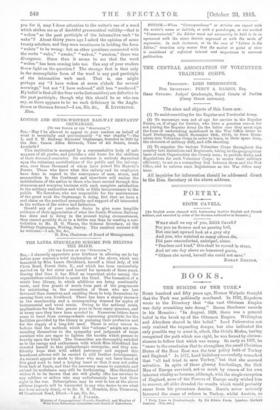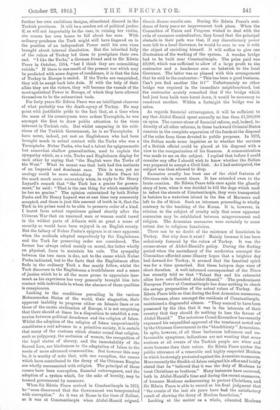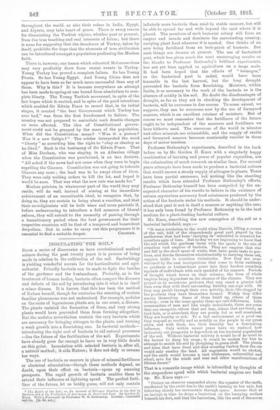BOOKS.
THE SUICIDE OF THE TURK.* SOME hundred and fifty years ago, Horace Walpole thought that the Turk was politically moribund. In 1797, Napoleon wrote to the Directory that "the vast Ottoman Empire was daily crumbling into decay." Baron Stookmar records in his Memoirs : "In August, 1829, there was a general belief in the break up of the Ottoman Empire. Wellington and Aberdeen shared in this belief." Lord Palmerston not only realized the impending danger, but also indicated the only possible way to avert it, albeit, like Ovid's Medea, having recognized the path which was right, he was forced by circum- stances .to follow that which was wrong. So early as 1837, he "came to the conclusion that to strengthen the small ChrietiLt11 States of the Near East was the true policy both of Turkey and England." In 1877, Lord Salisbury sorrowfully remarked that "all bad tried to save Turkey," but that she scorned salvation. In spite of these gloomy forebodings, the Sick Man of Europe survived, not so much by reason of his own inherent vitality as because, although, with the single exception of England, none of the Powers of Europe really wished him to recover, all alike dreaded the results which would probably ensue from his premature demise. Russia never seriously favoured the cause of reform in Turkey, whilst Austria, to * Forty Years in Constantinople. By Sir Edwin Pears. London: llerbert Jenkins. rice. lista further her own ambitious designs, stimulated discord in the Turkish provinces. It will be a sombre act of political justice if, as will not improbably be the case, in ruining her victim, she causes her own house to fall about her ears. With ordinary prudence the Turk might still have lingered on in the position of an independent Power until his own vices i brought about internal dissolution. But the inherited folly of the rulers of Turkey led them to precipitate their own end. "I like the Turks," a German friend said to Sir Edwin Pears in October, 1914, "but I think they are committing suicide." If there is one result of the present war which may be predicted with some degree of confidence, it is that the fate of Turkey in Europe is sealed. If the Turks are vanquished, they will be swept back into Asia. If with the help of their allies they are the victors, they will become the vassals of the most egotistical Power in Europe, of which they have allowed themselves to be the subservient tools.
For forty years Sir Edwin Pears was an intelligent observer of what probably was the death-agony of Turkey. He may point with justifiable pride to the fact that, at a time when the mass of his countrymen were ardent Turoophils, he was amongst the first to draw public attention to the vices inherent in Turkish rule. But whilst unsparing in his criti- cisms of the Turkish Government, he is no Turcophobe. I have never, indeed, yet met an Englishman who had been brought much in actual contact with the Turks who was a Turcophobe. Nubar Pasha, who had a talent for epigrammatic but somewhat shallow generalization, used to explain the sympathy which, as a rule, Turks and Englishmen display for each other by saying that "the English were the Turks of the West." What he meant was that both had the instincts of an Imperial and dominant race. This is true, yet no analogy could be more misleading. Sir Edwin Pears hit the mark much more accurately when, in reply to Sir Henry Layard's remark that "the Turk has a genius for govern- ment," he said : " That is the one thing for which essentially he has no genius." The opinion entertained by both Nubar Pasha, and Sir Henry Layard was at one time very commonly accepted, and there is just this amount of truth in it, that the Turk in his prime used to be able to preserve order of a kind. I learnt from actual experience gained shortly after the Crimean War that an unarmed man or woman could travel in the wildest parts of Albania with as great a sense of security as would have been enjoyed in an English county. But the fallacy of Nubar Paella's epigram is at once apparent when the methods adopted respectively by the Englishman and the Turk for preserving order are considered. The former has always relied mainly on moral, the latter wholly on physical, force to maintain his rule. The sympathy between the two races is due, not to the cause which Nubar Pasha indicated, but to the facts that the Englishman often Elude in the ordinary Turk a fine manly fellow, whilst the Turk discovers in the Englishman a truthfulness and a sense of justice which he is all the more prone to appreciate inas- much as his experience has very generally brought him into contact with individuals in whom the absence of these qualities is conspicuous.
Looking to the conditions prevailing in the various Mohammedan States of the world, their stagnation, their apparent inability to progress either on Islamic lines or on those of the exotic civilization of Europe, it is not surprising that there should at times be a disposition to establish a con- nexion between political decadence and the religion of Islam. Whilst the adoption of the religion of Islam unquestionably constitutes a real advance to a primitive society, it is certain that many of the customs which cluster round that religion, such as polygamy, the seclusion of women, the recognition of the legal status of slavery, and the immutability of the Sacred Law, are hindrances to the adaptation of Islam to the needs of more advanced communities. But however this may be, it is worthy of note that, with one exception, the causes which have contributed to the decay of the Ottoman Empire are wholly unconnected with religion. The principal of those causes have been corruption, financial extravagance, and the adoption of a system which, for the sake of brevity, may be termed government by massacre.
When Sir Edwin Pears arrived in Constantinople in 1873, he "soon discovered that the Government was honeycombed with corruption." As it was at Rome in the time of Sallust, so it was at Constantinople when Abdul-Hamid reigned. Omnia Romae venalia ease. During Sir Edwin Peare's resi- dence of forty years no improvement took place. When the Committee of Union and Progress wished to deal with the evils of excessive centralization, they found that the principal obstacle in their path was that, if any discretionary power were left to a local Governor, he would be sure to use it with the object of enriching himself. It will suffice to give one illustration of the working of the system. A wooden bridge had to be built near Constantinople. The price paid was £8,000, which was sufficient to allow of a large profit to the contractor and a handsome sum as bakshiah to the local Governor. The latter was so pleased with this arrangement that he said to the contractor : " This has been a good business.
Can't you find another like it?" Unfortunately no other bridge was required in the immediate neighbourhood, but the contractor acutely remarked that if the bridge which had just been built were burnt down, it would be necessary to construct another. Within a fortnight the bridge was in ashes.
As regards financial extravagance, it will be sufficient to say that Abdul-Hamid spent annually no less than £1,200,000 on spies. The corner-stone of financial reform, and, indeed, in- directly of all other reforms, in these backward Oriental States consists in the complete separation of the funds at the disposal of the ruler from those devoted to public! purposes. In 1878, the Sultan made some inquiries as to whether the services of a British official could be placed at his disposal with a.
view to the reorganization of his finances. A communication was made to me on the subject. I replied that before I could consider any offer I should wish to know whether the Sultan was prepared to accept a Civil List, As I had anticipated, the subject was then allowed to drop.
Excessive cruelty has been one of the chief features of Ottoman rule in recent times. It has extended even to the brute creation. Sir Edwin Pears tells once again the ghastly story of how, when it was decided to kill the dogs which used to infest the streets of Constantinople, they were transported in batches to a waterless island in the Sea of Marmora and left to die of thirst. Such an inhuman proceeding is wholly contrary to the teaching of the Koran. It is, however, in relation to the subject of cruelty only that some apparent connexion may be established between misgovernment and religion. The Armenian massacres were certainly to some extent due to religious fanaticism.
There can be no doubt of the existence of fanaticism in Turkey. But why does it exist P Mainly because it has been sedulously fostered by the rulers of Turkey. It was the corner-stone of Abdul-Hamid's policy. During the fleeting period when the ascendancy of the moderates amongst the Committee afforded some illusory hopes that a brighter day had dawned for Turkey, it seemed that the fanatical spirit was for a time quenched. But these halcyon days were of short duration. A well-informed correspondent of the Times has recently told us that " Talaat Bey and hie extremist allies have out-Hamided Abdul-Hamid." The predominant European Power at Constantinople has done nothing to cheek the savage propensities of the actual rulers of Turkey. Sir Edwin Pears tells us that during the first Armenian massacres, the Germans, alone amongst the residents of Constantinople, maintained a disgraceful silence. " They seemed to have been possessed by the idea that it was in the interests of their country that they should do nothing to lose the favour of Abdul-Haraid." The notorious Count Reventlow has recently expressed his unqualified approval of the treatment meted out by the Ottoman Government to the "bloodthirsty " Armenians, In spite, however, of all these barbarous influences and un. favourable symptoms, indications are not wanting that some sections at all events of the Turkish people are wiser and more humane than their rulers. Sir Edwin Pears quotes the public utterance of a venerable and highly respected Moslem in which he strongly protested against the Armenian massacres. More recently the Sheikh.ul-Islam resigned his office and boldly stated that he "believed that it was the duty of Moslems to treat Christians as brethren." Many instances have occurred, both in Abdul.Hamid's time and during the recent massacres, of humane Moslems endeavouring to protect Christians, and Sir Edwin Pears is able to record as his final judgment that the events of the last six years have had the satisfactory result of showing the decay of Moslem fanaticism."
Looking at the matter as a whole, educated Moderns throughout the world, as also their rulers in India, Egypt, and Algeria, may take heart of grace. There is every reason for dissociating the Turkish regime, whether past or present, from the true teaching and real interests of Islam ; but there is none for supposing that the decadence of Turkey, taken by itself, prohibits the hope that the elements of true civilization can be introduced amongst a population professing the Moslem faith.
There is, however, one lesson which educated Mohammedans may very profitably draw from recent events in Turkey. Young Turkey has proved a complete failure. So has Young Persia. So has Young Egypt. And Young China does not appear to have been so far much more successful than any of these. Why is this P It is because everywhere an attempt has been made to spring at one bound from absolutism to com- plete liberty. The Young Turkish movement, in spite of the fair hopes which it excited, and in spite of the good intentions which enabled Sir Edwin Pears to record that, in its initial stages, it created "the best Government which Turkey has ever had," was from the first foredoomed to failure. The country was not prepared to assimilate such drastic changes as were effected. The idea of Constitutional govern- ment could not be grasped by the mass of the population. What did the Constitution mean P " Was it a person P Was it a new Caliph ? " The soldier interpreted the word " liberty " as according him the right to "obey or disobey as be liked." Such is the testimony of Sir Edwin Pears. That of Miss Durham, who was staying in an Albanian village when the Constitution was proclaimed, is no less decisive. "All asked if the news had not come when they were to begin expelling the Giaours. Constitution was not going to tolerate Giaours any more ; the land was to he swept clean of them. They were only waiting orders to kill the lot, and hoped it would be soon. That was what the new rule was made for."
Moslem patriots, in whatsoever part of the world they may reside, will do well, instead of aiming at the immediate achievement of an unrealizable ideal, to recognize that, by doing so, they are certain to bring about a reaction, and that their co-religionists will be both wiser and more patriotic if, before endeavouring to introduce a full measure of liberal, reform, they will submit to the necessity of passing through a transitionary period when the best government for their respective countries will be that of a tempered and benevolent despotism. But in order to carry out this programme it is essential to find a suitable despot. CROMER.








































 Previous page
Previous page